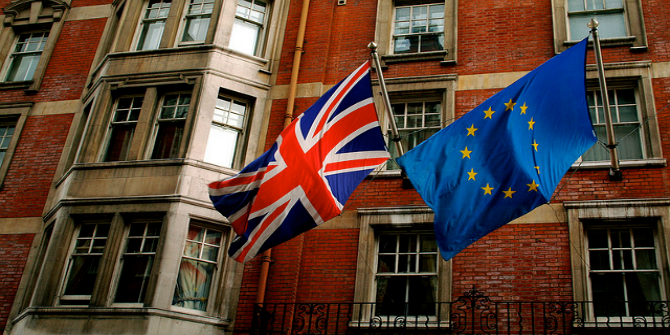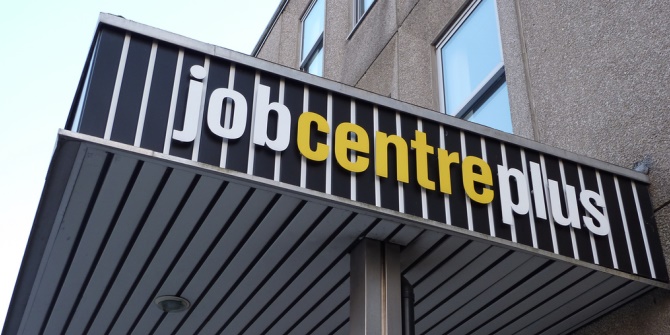

 Having interviewed young climate strikers, Dena Arya, Benjamin Bowman, and Sarah Pickard find that, despite critics often dismissing their motivations, protesters demonstrated a commitment to the cause as well as a clear awareness of the issue.
Having interviewed young climate strikers, Dena Arya, Benjamin Bowman, and Sarah Pickard find that, despite critics often dismissing their motivations, protesters demonstrated a commitment to the cause as well as a clear awareness of the issue.
Youth activism surged in 2019. Young people have been taking to the streets to demand immediate and significant action on climate change. The #FridaysForFuture movement, also known as the Youth Strike for Climate, is the best known part of a global wave of young activism on environmental degradation. School pupil Greta Thunberg started the movement and has gone on to call for action in the UK Parliament, UN summits, and other global events, inspiring young people around the world to protest. Youth-led movements for climate action are having an impact on the scientific community, politicians, and the public debate.
As researchers of young people’s political participation, we are not surprised that so many are taking action. Yet it is rare to hear the views of young people themselves in media coverage and in political debates, which often generalise and generationalise them. Here, we share some of the voices we encountered during our study of the Global Climate Strikes, which is part of a wider project that includes young activists in Extinction Rebellion.
We spoke with young climate change protesters at school strikes in Edinburgh, Manchester, and Nottingham in September 2019. Young protesters were asked to explain their placards, posters and banners in face to face interviews. What they said clearly varied a lot between younger school age participants (ages 11-18) and older participants (ages 19-34). However, what stood out in young people’s comments, no matter the age, was the awareness of the issues, the commitment to the cause and the emotions engendered.
‘We want politicians to listen and we hope they will act’
A very clear message came from the youngest participants in our interviews. When we asked them: ‘who would you like to show your placard to if you could?’, a majority stated they wanted MPs, the Prime Minister, as well as corporations and oil companies to see and hear their messages. These young people expressed faith in politicians and power holders to make the world a better place, i.e. to do something quickly and effectively about climate change. For example, Jasmine (14), commented ‘I think the government will realise it is a big issue and will do something…I hope the government is listening.’ Illaria (16) said she wanted to show her placard to:
heads of big oil companies […] even though I am sure it wouldn’t do anything because they’re clearly […] fuelled by a, sort of, greed for money and things and hence why they are not doing anything because it’s all short-term gain.
There was an obvious difference between younger and older participants with whom we spoke. Whilst young adults also expressed hope and optimism around how they could affect positive change with regards to climate change, on the whole they had more scepticism about governments and other power-holders. For example, Louise (22) replied: ‘I’d show my poster to corporations that should care more and have more influence.’
This came across in their comments about corporations and ‘big business’ and in that they mostly did not mention showing their placards to politicians.
Community spirit and positive actions
Moreover, the young people speaking with us were not just looking to push politicians and corporations into action. In both groups – school pupils and young adults – there were ideas put forward about how to address the issue of climate change. Some looked at the solution as part of the wider ecological crisis and some specifically at the reduction of Co2 emissions with a focus on climate change. They mentioned the enjoyment of being with like-minded people and of sharing a strong sense of community from other strikers. They also talked about feeling involved in something big, as well as trying to do something positive and ‘be part of the solution.’ For example, Drew (16) carried a sign that said ‘Waves of Support’ and explained: ‘It’s artistic, but also spreads the message that everyone needs to get involved, which I quite like.’
Indeed, what came through in interviews with many of the young climate strikers was a sense of collective power to make change happen. They identified individual and collective actions as ways to move forward. Some spoke about the importance of consumer power. For example, Sarina (24) mentioned:
You need to understand that your individual impact is huge […] I am simply not buying things because I know that everytime I buy something it’s like going out to vote ‘…’ this is your ballot paper.
Whilst many of them expressed that individual action alone might not make a big difference, they often stated that by acting together, they could make change happen. For example, Corrie (14) pointed out:
people think that it’s just an individual you are not going to do something as an individual but if so many individuals do something it’s obviously gonna change something.
Others spoke about getting more involved in the parliamentary process or more radical ideas of socialist governments and system change. Allan (18) said: ‘capitalism is taking all of the world’s resources and using it for profit and just killing the earth.’
Whether their solutions were more radical or reformist, individual or collective, they were often also imbued with a sense of empowerment, inclusivity, and hope that they could affect the future. Despite this, many of the young activists we spoke to clearly outlined, regardless of age that the biggest culprits with regards to climate change are corporations and the oil industry, all driven by greed and profit.
Environmental activism and strong emotions
But one thing really stood out across all of the locations and ages: the very emotional responses given by the young activists. Whilst those interviewed expressed a great deal of hope and optimism that there is still time to make a difference, there was also a great deal awareness of the challenges that many people across the world are already facing. There are those who point to the fears that young climate strikers express as being a result of scaremongering. However, many of the young climate strikers we spoke with were both aware of the science and understood the wider connections that climate change has with issues around social justice. Whilst some expressed fears and concerns, they also demonstrated resilience and a sense of determination and belief in themselves to be able to make a change. For example, Amy (21) explained:
I think the way to deal with the heaviness is just to do something […] rather than lie in bed and think ‘I can’t sleep everyone is going to die!’. Like you are going to die anyway at some point… but you can make things better before that.
We found that the fears of climate activists was put into action and, overall, there was a sense of dedication and hope. Detractors of the young people’s climate movement sometimes criticise environmentalists for scaring young people. Yet the young people we met were not like their critics portray them: they had not been scared by adults but, rather, they were more or less in touch with the development of policy, the findings of scientists concerning the climate, and they wanted to take action. The atmosphere at the climate strikes has been positive and committed, and young strikers talked about making things better, working together and helping the people around them.
Conclusion
Much of the mainstream media coverage of school pupils striking for action on climate change has tended to focus on Greta Thunberg. There has been substantial and increasing disapproval of her from certain politicians and commentators in the UK and elsewhere. Criticism is centred on the 16-year-old being immature, theatrical, ill-informed and manipulated. The underlying message from her critics is that she should not be listened to as her views and actions are illegitimate and by extension those of the thousands of young protesters around the world.
The young people we interviewed showed very clearly that they are interested in political issues and democracy. They want their voices to be heard. The trust in politicians expressed shows the fundamental responsibilities the political class has in terms of meeting their expectations and the future of participatory democracy. Regarding action on climate change, an issue that is so important to many young people, politicians need to step up and listen to young voices, but then to act. Otherwise, the disappointment among young people will be huge.
________________
Note: We interviewed 40 young climate change strikers on 20 September 2019 in Manchester and Nottingham, then on 27 September 2019 in Edinburgh using the same questions and methods. All participants signed a consent form allowing us to record and reproduce interviews with them. Signed parental consent was obtained on the spot from participants under the age of 16. Some of the participants used their real first names, whilst others gave a pseudonym.
 Dena Arya is a PhD student at Nottingham Trent University, working on a qualitative exploration of the impact of economic inequality young people’s environmental politics in the United Kingdom.
Dena Arya is a PhD student at Nottingham Trent University, working on a qualitative exploration of the impact of economic inequality young people’s environmental politics in the United Kingdom.
 Benjamin Bowman is Lecturer at Manchester Metropolitan University. He is primary investigator on the project ‘Youthquakes: young civic engagement and political action in challenging times.’
Benjamin Bowman is Lecturer at Manchester Metropolitan University. He is primary investigator on the project ‘Youthquakes: young civic engagement and political action in challenging times.’
 Sarah Pickard is Senior Lecturer at Université Sorbonne Nouvelle – Paris 3. Her research focuses on diversity and interaction of young people’s political participation. She published Politics, Protest and Young People in 2019.
Sarah Pickard is Senior Lecturer at Université Sorbonne Nouvelle – Paris 3. Her research focuses on diversity and interaction of young people’s political participation. She published Politics, Protest and Young People in 2019.
All articles posted on this blog give the views of the author(s), and not the position of LSE British Politics and Policy, nor of the London School of Economics and Political Science. Featured image credit: Dena Arya.








A handful of interviews – we are not told how many – is not very convincing on anything. If you feel strongly about something and become an activist you will almost certainly demonstrate you are more informed than those who do not share your enthusiasm. It does not however always mean that you are right or that people should take you as seriously as you think they should. Some of the public attacks on Ms Thunberg have been pretty vile, but would have been directed at anyone with a high public profile regardless of age. Claims of immaturity are not without some merit, but if she had been much older another link of attack would have been found.